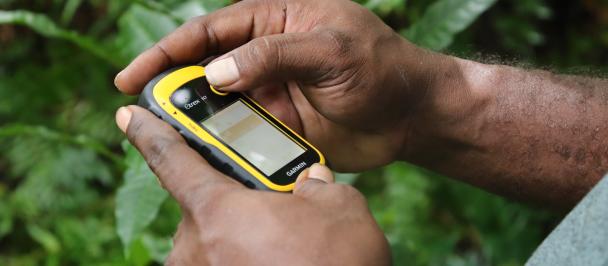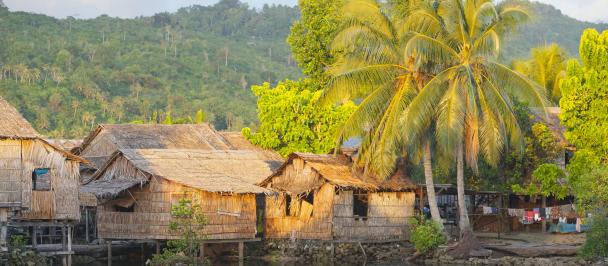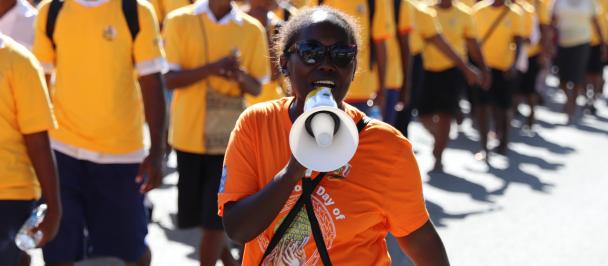Gender equality and women’s empowerment contribute to lasting peace and resilient communities. The union and collaboration between indigenous Solomon Islanders and other groups within the country were regulated by their own customary jurisdictions from the first day. The customary jurisdictions and the governance system lay the foundation for peace and sustainable development in Solomon Islands.
Women's land rights matter
Vaela Ngai, Supervising Director for the Women’s Development Division (WDD) within the Ministry of Women, Youth, Children and Family Affairs (MWYCFA) and a Facilitator in the TGB preparatory sessions for women leaders. (Photo: Audrey M Manu, UN Women Solomon Islands)
Joining the Ministry of Women, Youth, Children, and Family Affairs (MWYCFA) was an eye-opening opportunity for Mrs. Vaela Ngai because it showed that women were treated differently and, thus, it taught her about the different forms of discrimination women face every day.
As a member of the Women’s Development Division (WDD), Mrs. Ngai is working to coordinate, implement, monitor, and report issues affecting women in Solomon Islands. Along with the Ministry of Women, Youth, Children, and Family Affairs, the WDD promotes gender equality in both the Solomon Islands’ government and the state.
Empowering women and girls and promoting their rights is part and parcel of most of Solomon Islands’ customary laws. Even though women are underrepresented in local authorities, they are and will be integral to communities.
Mrs. Ngai, Supervising Director for WDD within MWYCFA said, “Women’s and girls’ voices and perspectives on land and natural resources must be known and heard because of their gender roles and different experiences using the land and natural resources.”
Despite COVID-19 crisis, WDD supported by the Inclusive Governance of Natural Resources project implemented by UN Women and UNDP in the Solomon Islands managed the implementation of the Traditional Governance Bill consultations with women across the country.
Inclusion Matters
Nanette Panda from Vella La Vella, Member of the Western Province Women’s Caucus, Solomon Islands. (Photo: UNDP/Merinda Valley)
Mrs. Nanette Panda was chosen to represent her community on some legal issues regarding land at the Chiefs hearing at the tribal level in local courts and the High Court. Over time, she realized she wanted to represent and advocate for her community everywhere.
As a member of the Western Province Women’s Caucus, she has been working with change-makers and activist to advocate for women’s rights at the level of decision-making, especially at the provincial level through the Temporary Special Measures. Mrs. Panda and the Caucus take care of women’s voices to be heard, respected and counted because women must have a right to speak to an issue that directly affects them.
Around 80 per cent of people in Solomon Islands live in rural areas, and these are people who use the land and natural resources in their everyday life. Therefore, their voices must be heard.
Nanette Panda from Vella La Vella and Member of the Western Province Women’s Caucus, Solomon Islands said, “Consultations should include a dialogue with communities to capture their real experiences to improve policies. Hence, we should learn how to make laws and politics more inclusive to capture women’s voices and experience. At the end of the day, it is the equal involvement of men and women that will help us build resilient and inclusive communities.”
Equality matters
Riko Nagu, Women’s rights activist from Noro, Western Province of Solomon Islands. (Photo: UNDP/Tangolo Hivu)
Riko Nagu was chosen among many other talented women to take the place of the President of Noro’s Council of Women. Since that moment, she became an active defender of women’s and girls’ rights, especially at the provincial level.
Mrs. Nagu is also a member of the United Church Women’s Fellowship (UCWF), where they focus on four thematic areas – education, devotion, recreation and service. The UCWF and these four areas helped local women find confidence and develop leadership skills and make a difference and impact other women’s and girls’ lives at the community level.
In Solomon Islands, rural community, especially rural women, are underrepresented in both state and local government authorities. Thence, women’s experiences and perspectives remain uncounted and unheard in policies and laws, which directly impact their future and lives.
Mrs. Riko Nagu emphasizes why it is significant to make rural communities’ voices visible and known. She said, “We must learn how to hear communities’ voices, the voices of the rural population as they are those who are attached to the land, live with it and are closer to their land and natural resources because people are using it daily, and they do survive, thanks to it. These voices are crucially important in decision-making processes on land and natural resources.”
The Inclusive Governance of Natural Resources Project is working with and supporting the provinces and communities by strengthening youth and women's participation in the Traditional Governance Bill and capacity building trainings on peacebuilding, anti-corruption, and climate change linking to the natural resource management.
The Traditional Governance and Customs Facilitation Bill provides for the regulation of traditional governance systems and structures and the preservation of cultural heritages. Both previous and current Solomon Island governments have prioritized passing the Traditional Governance Bill.
With the 2030 Agenda as a guiding thread, UNDP and UN Women work to advance women’s participation in civic and political life, their economic empowerment and their role as builders of peace and resilience.
---
The article is prepared within the Inclusive Governance of Natural Resources (IGNR) project implemented by UNDP in Solomon Islands and UN Women funded by the UN Peacebuilding Fund to support and empower local youth and women of Solomon Islands to ensure their participation in the decision-making processes.

 Locations
Locations






